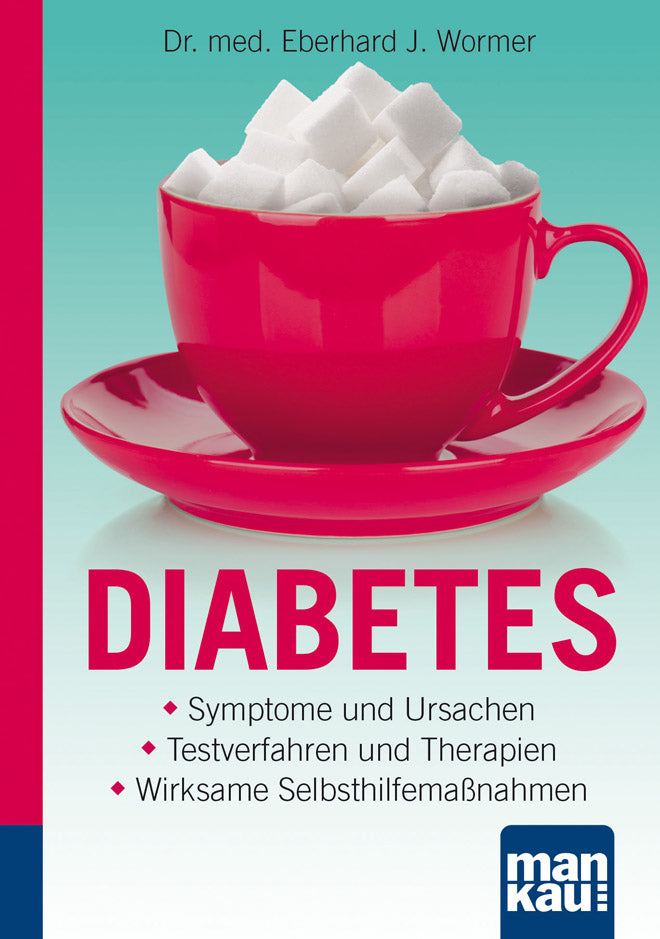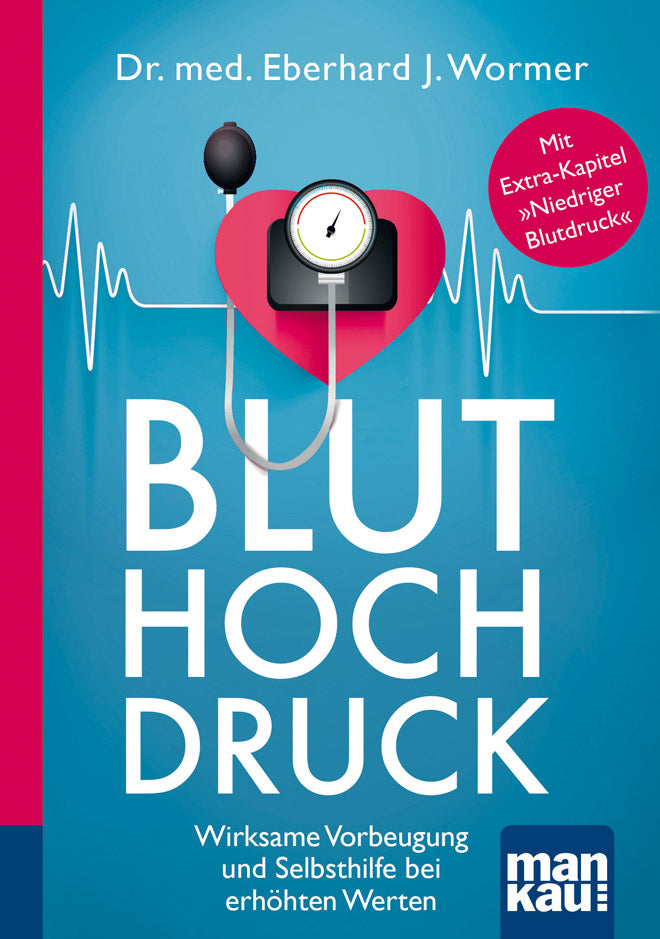
"When 'sugar' threatens to make life bitter..."
"When 'sugar' threatens to make life bitter..."
Interview with general practitioner and guidebook author Dr. Eberhard J. Wormer
"Type 2 diabetes is increasing at an alarming rate. It goes hand in hand with an unhealthy lifestyle, a mix of obesity, poor diet and lack of exercise. Even children are increasingly affected. It is therefore good to know how to prevent diabetes or, if you do develop the disease, how to effectively control your sugar metabolism through sensible changes in your lifestyle and diet."
Dr. Eberhard J. Wormer, author of the compact guide “Diabetes,” provides the necessary background knowledge and concrete self-help measures for diabetes so that those affected can continue to enjoy their lives to the full.
Diabetes mellitus has been known since ancient times, but this disorder of sugar metabolism has now developed into a widespread disease that is spreading like an epidemic. What are the reasons for this?
Dr. med. Wormer: The reason for this is clearly an incorrect lifestyle, characterized by a lack of exercise, an unhealthy diet and being overweight.
Medicine distinguishes between different types of diabetes. What are they and what symptoms does the disease manifest itself with?
Dr. med. Wormer: Diabetes mellitus types 1 and 2 are the most important diseases. There is also gestational diabetes and other forms of diabetes, although these are very rare. People with type 1 diabetes suffer from an autoimmune disease caused by a disorder of the immune system. As the disease progresses, the immune system destroys the insulin-producing cells of the islets of Langerhans in the pancreas. An insulin deficiency occurs and too little glucose reaches the cells, which leads to increased blood sugar levels. Symptoms include tiredness and fatigue, frequent urination, severe thirst, weight loss, nausea, vomiting, abdominal pain, dry and itchy skin and an acetone smell in the breath. Type 2 diabetes is insulin resistance in the body's cells, which is often associated with high blood pressure and high cholesterol levels. The pancreas produces enough insulin, but the cells become increasingly insensitive to the hormone - until they finally no longer respond to insulin at all. Typical signs of type 2 diabetes are poorly healing wounds, dry or itchy skin, increased thirst, fatigue, susceptibility to infections and frequent urination.
In addition to hereditary factors, it is primarily unhealthy lifestyle habits that promote the development of type 2 diabetes. What are the risk factors for diabetes, and what do you need to pay particular attention to in order to mitigate them?
Dr. med. Wormer: As already mentioned, lack of exercise and obesity or poor eating habits are important risk factors for type 2 diabetes - the unhealthy modern lifestyle! So you should definitely keep an eye on your weight, exercise and make sure you eat a healthy, balanced diet.
Studies have shown that there is a connection between vitamin deficiency and diabetes. Which vitamins should you pay particular attention to?
Dr. med. Wormer: Basically, a good supply of vitamins should always be ensured - this applies to healthy people as well as to high-risk patients or diabetics! In relation to diabetes, optimal vitamin D and vitamin C levels in particular have a positive effect. A deficiency in these two vitamins has been proven to promote the development of diabetes and makes successful treatment more difficult.
Drug therapy with insulin plays an important role in the treatment of diabetes. What different forms of treatment are there?
Dr. med. Wormer: Type 1 diabetes is treated with insulin immediately after diagnosis. Insulin therapy replaces the body's lack of insulin. In type 2 diabetics, an attempt should be made to get the metabolism under control through targeted exercise, a healthy, wholesome diet and weight loss before using oral antidiabetics - and in most cases this is successful! In some cases, however, the body's insulin production still needs to be supplemented with insulin therapy. The relatively strict conventional insulin therapy (CT) is mainly prescribed for type 2 diabetics. For type 1 diabetics, it should only be used temporarily in exceptional cases. There are also various forms of intensive insulin therapy (ICT). For type 1 diabetics, this therapy is only recommended in phases. Combination therapy with insulin and oral antidiabetics (BOT) is used for type 2 diabetics who have excessive fasting values in the morning.
Since poorly controlled blood sugar levels can lead to complications and secondary diseases, monitoring the progress is also part of a holistic health strategy. Which values are checked regularly?
Dr. med. Wormer: A check-up should be carried out every three months, during which the blood sugar and HbA1c values - this is a certain form of the blood pigment hemoglobin - are checked. Blood pressure, body weight and BMI, i.e. the body mass index, as well as the condition of the feet are also checked. Depending on the state of health, tests of blood lipid levels, a stress ECG, kidney function tests and a visit to the ophthalmologist (fundus of the eye, vision) are also recommended at least once a year. A thorough examination by the dentist should also be carried out in order to detect receding gums and gum disease at an early stage.
A balanced and healthy diet is an important part of diabetes therapy. How can diabetics eat properly, and which foods or beverages should they definitely avoid?
Dr. med. Wormer: Type 1 diabetics must not skip a meal, should eat snacks and must always keep an eye on the carbohydrate content of their food in order to adjust the insulin dose accordingly - the same applies to type 2 diabetics who inject insulin. I personally recommend eating according to the LOGI method. It helps to avoid major fluctuations and spikes in blood sugar, keeps the insulin level in the blood relatively low and effectively prevents metabolic disorders. Alcohol should be avoided if possible, as it stimulates insulin activity and is a risk factor for hypoglycemia. If you do drink alcohol for a special occasion, for example, you should always eat something with it - e.g. a slice of wholemeal bread.
Although diabetes can be treated quite well, many sufferers find it difficult to accept their illness or change their lifestyle habits. Where can you find support to learn how to deal with the illness?
Dr. med. Wormer: The exchange of experiences between those affected is very important. You learn how to deal with the disease better, you can support each other, give advice, exchange recipes, maybe even meet a training partner and much more. You can get addresses from your doctor or diabetes consultant, from the German Diabetes Association or from the German Diabetes Aid.
Book tip:
Dr. med. Eberhard J. Wormer: Diabetes. Compact guide (symptoms and causes, testing procedures and therapies, effective self-help measures). Mankau Verlag, 1st edition April 2017, paperback, 11.5 x 16.5cm, color, 127 pages, 8.99 euros (D) / 9.20 euros (A) ISBN 978-3-86374-383-3.
Link recommendations:
More information about the "Diabetes" guide
To the reading sample in PDF format
More about Dr. Eberhard J. Wormer
To the Internet forum with Dr. Eberhard J. Wormer











